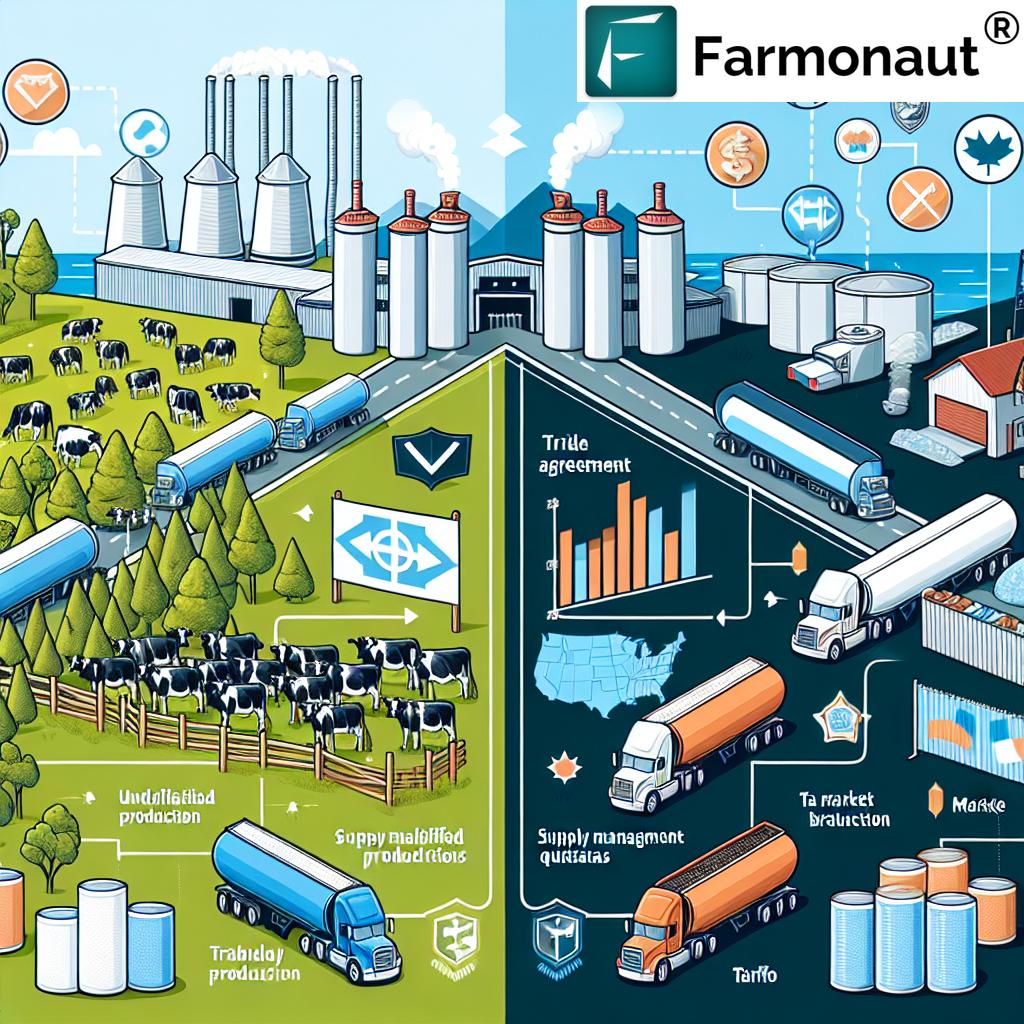Madawaska’s Economic Tightrope: How US-Canada Border Tariffs Reshape Rural Communities
“Madawaska, Maine, a US-Canada border town, sees daily life shaped by cross-border shopping and fluctuating gas prices.”
In the picturesque town of Madawaska, Maine, nestled along the US-Canada border, we find ourselves at the epicenter of a complex economic and cultural tapestry. As we delve into the intricate dynamics of this border community, we’ll explore how the looming specter of tariffs and trade wars is reshaping the very fabric of rural life in this unique corner of North America.

Our journey begins at Larry’s One Stop, a gas station that serves as a microcosm of the US-Canada border economy. Here, we meet Kim Thibodeau, a Madawaska resident whose daily life embodies the cultural and practical complexities of border living. Originally from Fort Kent, Thibodeau now finds herself at the heart of a business that thrives on Canadian customers seeking lower-priced fuel.
The Delicate Balance of Border Economics
The economic ecosystem of Madawaska and its Canadian sister city, Edmundston, New Brunswick, hinges on a delicate balance of cross-border commerce. Gas stations like Larry’s One Stop exemplify this interdependence, with a staggering 90% of their business coming from Canadian customers. This reliance on cross-border shopping underscores the potential vulnerabilities that tariffs could introduce to the local economy.
- Cross-border shopping revenue accounts for a significant portion of the local economy
- Fluctuating exchange rates directly impact consumer behavior
- Local businesses adapt their strategies to cater to both American and Canadian clientele
The proposed tariffs on Canadian goods by U.S. President Donald Trump have sent ripples of anxiety through the community. When the implementation of these tariffs was delayed, businesses like Larry’s One Stop breathed a collective sigh of relief, knowing that higher prices could deter their vital Canadian customer base.
The Human Face of Trade Politics
As we explore the streets of Madawaska, we encounter a community grappling with the potential ramifications of international trade policies on their daily lives. The tariff impact on border towns extends far beyond economic statistics; it touches the very heart of community relationships and individual livelihoods.
Residents express a mix of concern and resilience in the face of economic uncertainty. Many have cultivated a lifestyle that seamlessly blends American and Canadian influences, with dual citizenship and frequent border crossings being the norm rather than the exception.
“We’ve always been one community, really,” says Marie Pelletier, a local shopkeeper. “The border is just a line on a map for us. We shop, work, and have family on both sides.”
This sentiment echoes throughout Madawaska, where the intertwining of cultures and economies has created a unique border identity. However, the looming threat of tariffs has introduced an undercurrent of anxiety about the fragility of this interconnectedness.
A Town in Transition
Madawaska’s story is one of transformation and resilience. With deep roots in Acadian culture, the town has weathered significant changes over the past half-century. A 30% population decline over 50 years, driven by factory relocations and broader economic shifts, has left an indelible mark on the community.
- Population decline of 30% over 50 years
- Loss of manufacturing jobs
- Adaptation to changing economic landscapes
Despite these challenges, the spirit of Madawaska remains strong. Residents have forged tight-knit relationships that transcend national boundaries, creating a community fabric that is both resilient and adaptable.
The Political Divide
In recent years, a new fault line has emerged in Madawaska’s social landscape. The political atmosphere has shifted, with diverging opinions on the Trump administration’s trade strategies creating palpable tension within the community.
Conversations at local gathering spots, such as Tim Horton’s, reveal a community divided. Long-time Democrats express fear over job security in the face of potential tariffs, while some Republicans view them as a necessary measure for negotiating better trade terms.
“It’s complicated,” admits Jean-Paul Michaud, a retired millworker. “We want fair trade, but we also don’t want to hurt our neighbors across the river. It’s a tough balance.”
This political divide adds another layer of complexity to the already intricate tapestry of border life in Madawaska.
Economic Impacts: A Two-Way Street
The potential economic impacts of tariffs are felt keenly on both sides of the border. Economists warn that uncertainty could influence business strategies and squeeze the livelihoods of border residents by increasing costs and eroding trust in long-standing bilateral relationships.
In response to American politics, some Canadians have begun boycotting U.S. products, a trend that could further strain cross-border relations. The mayor of Edmundston acknowledges the potential challenges that increasing tensions could pose to the interconnected communities.
| Economic Indicator | Pre-Tariff Madawaska | Post-Tariff Madawaska (Estimated) | Canadian Border Town |
|---|---|---|---|
| Average gas prices (USD/CAD) | $2.50 / $3.25 | $2.75 / $3.60 | $3.00 / $3.90 |
| Cross-border shopping revenue (% of local economy) | 35% | 25% | 30% |
| Unemployment rate (%) | 6% | 8% | 7% |
| Number of businesses with cross-border operations | 50 | 40 | 45 |
| Tourism revenue (USD/CAD in millions) | $10 / $13 | $8 / $10.4 | $9 / $11.7 |
| Cross-border commuters (% of workforce) | 15% | 12% | 14% |
This table illustrates the potential economic shifts that tariffs could bring to both Madawaska and its Canadian counterpart. The estimated post-tariff figures for Madawaska show a clear impact on various economic indicators, from gas prices to cross-border commuter percentages.
Adapting to Change: The Resilience of Border Communities
Despite the economic worries, some local residents continue to defend the tariffs, believing they may lead to necessary adjustments in trade practices that are seen as unfair. They argue that American shoppers have more leeway than Canadians in cross-border shopping laws, and thus hope for a renegotiation of trade dynamics.
This perspective highlights the complex nature of border economics and the differing viewpoints within the community on how best to address perceived imbalances in the Canadian-American trade relations.

“Rural communities straddling the US-Canada border often navigate dual citizenship and cross-border family connections, impacting local economies.”
The Broader Implications
The struggles faced by Madawaska and similar border towns offer a microcosm of larger international trade dynamics. These communities serve as real-world laboratories where the effects of trade policies play out in tangible ways, affecting everything from gas prices to family reunions.
- Border towns as indicators of broader trade relations
- Impact of national policies on local economies
- The role of cultural ties in economic resilience
As we consider the broader implications of these local struggles, it becomes clear that the fate of border communities like Madawaska is inextricably linked to the larger narrative of US-Canada relations and rural economic development.
Innovative Solutions for Rural Economies
In the face of these challenges, communities like Madawaska are exploring innovative solutions to diversify their economies and build resilience. One such approach involves leveraging technology to create new opportunities in agriculture and related sectors.
For instance, platforms like Farmonaut are revolutionizing the way farmers manage their operations, offering satellite-based farm management solutions that can help rural communities adapt to changing economic landscapes. While not directly addressing the tariff issue, such technologies can provide valuable tools for rural economic diversification.
Farmonaut’s platform offers features such as real-time crop health monitoring, AI-based advisory systems, and resource management tools. These technologies can help farmers in border regions optimize their operations, potentially offsetting some of the economic pressures created by changing trade dynamics.
The Role of Technology in Border Economies
As border communities like Madawaska grapple with the potential impacts of tariffs, technology can play a crucial role in creating new economic opportunities. For example, Farmonaut’s API allows developers and businesses to integrate satellite and weather data into their own systems, potentially fostering innovation in the agricultural sector.
This type of technological integration could help border communities diversify their economies beyond traditional cross-border trade, creating new avenues for growth and resilience.
Looking to the Future
As we conclude our exploration of Madawaska’s economic tightrope, we’re left with a profound appreciation for the resilience and adaptability of border communities. Despite the challenges posed by shifting trade policies and economic uncertainties, the spirit of cooperation and shared cultural heritage continues to bind these communities together.
The story of Madawaska serves as a powerful reminder of the human dimension of international trade policies. It underscores the need for thoughtful, nuanced approaches to trade negotiations that consider the unique circumstances of border communities.
Conclusion: Navigating the Economic Tightrope
As Madawaska and similar border towns continue to navigate the economic tightrope between two nations, their experiences offer valuable lessons for policymakers and economists alike. The delicate balance between national interests and local realities, between economic pragmatism and cultural ties, will continue to shape the future of these unique communities.
In the face of uncertainty, the residents of Madawaska demonstrate a remarkable capacity for adaptation and resilience. Their story is a testament to the enduring strength of community bonds and the innovative spirit that characterizes life along the US-Canada border.
As we look to the future, it’s clear that the fate of border communities like Madawaska will play a crucial role in shaping the broader narrative of US-Canada relations. By understanding and addressing the unique challenges faced by these communities, we can work towards trade policies that foster economic growth while preserving the rich cultural tapestry that defines life along the border.
FAQ Section
- How do tariffs affect gas prices in border towns like Madawaska?
Tariffs can lead to increased gas prices, potentially deterring Canadian customers who cross the border for cheaper fuel. This can significantly impact local gas stations that rely heavily on cross-border business. - What are the main economic challenges faced by US-Canada border towns?
Border towns often grapple with population decline, job losses in traditional industries, and economic uncertainties related to fluctuating exchange rates and changing trade policies. - How do cross-border shopping laws differ between the US and Canada?
Generally, American shoppers have more leeway in terms of the value of goods they can bring back without paying duties, compared to their Canadian counterparts. This disparity is a point of contention in border communities. - What role does dual citizenship play in border communities?
Dual citizenship is common in border towns, allowing residents to work, shop, and access services on both sides of the border. This flexibility is a unique aspect of border life but can be complicated by changing trade policies. - How are border communities adapting to economic challenges?
Many border towns are exploring ways to diversify their economies, leveraging technology and innovation to create new opportunities. Some are also focusing on strengthening cultural ties and tourism to boost local economies.
Earn With Farmonaut: Affiliate Program
Earn 20% recurring commission with Farmonaut’s affiliate program by sharing your promo code and helping farmers save 10%. Onboard 10 Elite farmers monthly to earn a minimum of $148,000 annually—start now and grow your income!
Additional Resources
For those interested in learning more about the technologies shaping modern agriculture and potentially impacting rural economies, consider exploring these resources:
- Farmonaut API Developer Docs – Understand how satellite and weather data can be integrated into agricultural applications.
- Farmonaut Android App – Experience firsthand the tools available to modern farmers for crop monitoring and management.
- Farmonaut iOS App – Access advanced farm management tools on your Apple devices.
As we continue to monitor the evolving situation in Madawaska and other border communities, it’s clear that the interplay between local economies, international trade policies, and technological innovation will shape the future of these unique regions. The resilience and adaptability demonstrated by border town residents offer hope for a future where economic prosperity and cultural heritage can coexist and thrive.
















